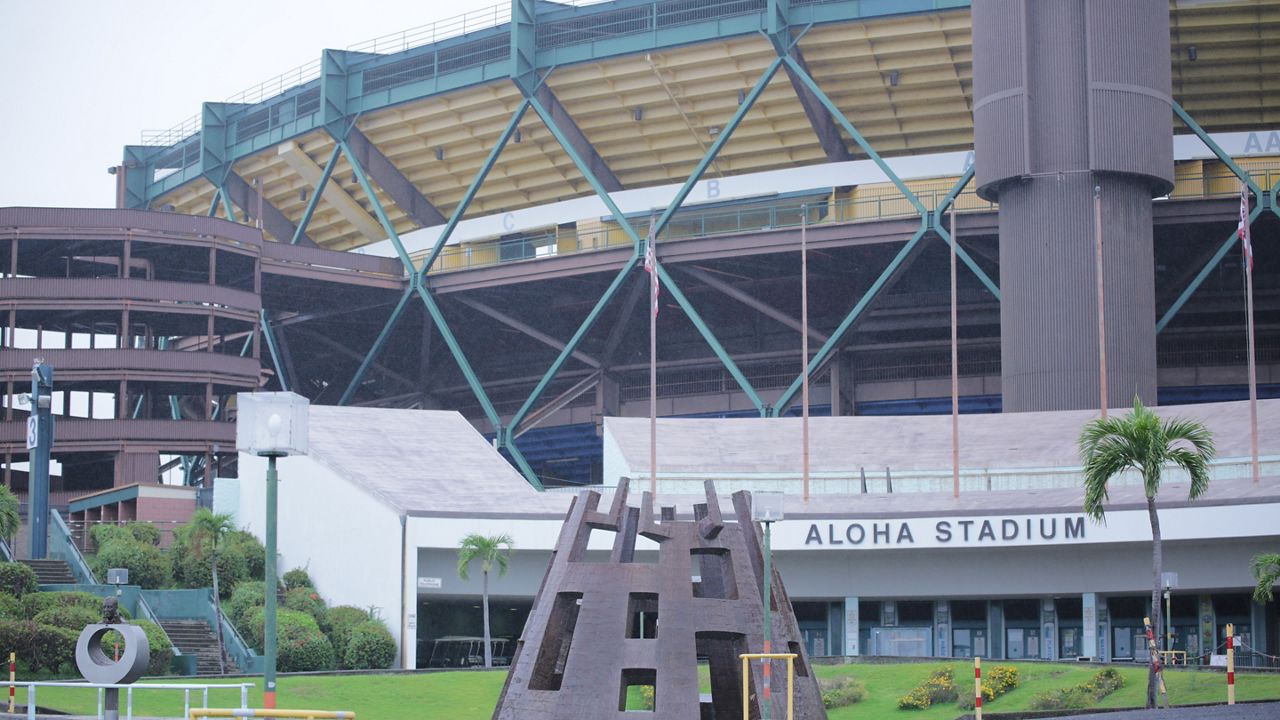HONOLULU — After March’s monthly meeting of the Aloha Stadium Authority, there had been optimism that Thursday morning’s April session would bring word of a path forward for the mired New Aloha Stadium Entertainment District Project.
Like much else regarding the troubled project over the last two years, that did not come to pass. The key stakeholders who must decide what sort of procurements will be made to proceed with the project — Gov. Josh Green’s administration, members of the Legislature, and the Stadium Authority — were unable to meet during a busy portion of the Legislative calendar, it was revealed.
There was, however, a celebrated move for the Stadium Authority at its meeting in the boardroom within the bowels of degrading Aloha Stadium on Thursday. Brennon Morioka, the vice chair of the stadium’s eight-person board who has been acting chair for the last nine months, was nominated and unanimously confirmed by the other seven members to become full chair of the body.
Not much will change for Morioka within the board with the official title, he said, but he allowed that it could impact how he is viewed externally.
Morioka told his fellow Authority members and participants on Thursday’s Zoom call and reiterated to Spectrum News, after the conclusion of the one-hour session, that the Authority’s meeting in late May is the new target to share good news on NASED. The Legislative session ends May 4.
“I’m hopeful that now everybody’s schedules will start to free up, especially on the Legislative and on the administration’s side because they don’t have to be in hearings all the time. So hopefully a meeting will happen very quickly,” Morioka told Spectrum News.
Green, like his predecessor David Ige, has halted the Request For Proposals process for private bidders because he has a divergent view from the Stadium Authority on how the stadium construction — and demolition of the existing stadium — should proceed.
Green said recently he now favors a design, build, operate and maintain, or DBOM, plan for a private partner to develop the stadium, whereas the NASED existing plans — for which $25 million has already been spent in the mock-up process — favored by the Authority call for a private partner to design, build, finance and maintain, or DBFM, the stadium and outlying mixed-use acreage of housing and entertainment.
With the ongoing delay in the RFP process, projections for the readiness of a new stadium are steadily moving from 2027 to 2028.
“At least the last couple meetings that we participated in with the administration and the legislative branch was very productive,” Morioka told Spectrum News. “We got to do a lot of educating. A lot of fleshing out of the different opinions on things. I think that having this follow-up meeting is going to be a very critical component of getting a final decision on what the procurement pathway going forward is going to look like.”
Morioka is dean of the University of Hawaii at Manoa College of Engineering. The six-year member of the Authority said he would recuse himself on matters that involve UH, the primary tenant of the old stadium and the would-be future stadium.
During Thursday’s session, there came word via Zoom from State Sen. Glenn Wakai, who represents the Halawa district, that the Legislature is poised to extend the $49.5 million in operational financing for the new stadium for use in either of the next two years. Without it, the state would have only the $350 million previously pledged by the Legislature, not $400 million.
The Authority was buoyed by the news.
“Hopefully we will get the stadium the people of Hawaii deserve at this point,” board member John Fink said, “as opposed to a maybe cut-back version that will not allow us to … have other wonderful events there because the potential stakeholders will say it’s not what we need.”
Eric Fujimoto, a private wealth advisor with Ameriprise Financial Services, LLC, and an existing board member, was unanimously picked by the Stadium Authority to become its new vice chair.
“Someone like Eric has been invaluable especially with his financial experience in helping us understand markets and financing,” Morioka said, “especially as we go through some of these procurements and looking at the development opportunities, business and commercial opportunities for the overall property.”
Brian McInnis covers the state's sports scene for Spectrum News Hawaii. He can be reached at brian.mcinnis@charter.com.



